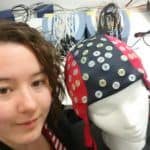Profile
Rebecca Williams
-
About Me:
Hello there! My name is Rebecca and I live in Cambridge where I’m also studying for a PhD in neuroscience. In my spare time I enjoy playing games (of the video, board and card variety) as well as performing in theatre shows. My claim to fame is that I once sang for Kate Bush while dressed as a pirate.
-
Read more
Hello there! My name is Rebecca and I currently live in Cambridge though I’m originally from Wigan in the North of England, home of rugby – go Leopards!. I’m studying for a PhD in neuroscience, focussing on dementia research. This means that my job often involves meeting dementia patients, scanning brains, and ludicrous amounts of coding.
When not in the lab I love playing games (of the video, board and card variety) and am a particular fan of Dungeons & Dragons. I have a game running currently which has been going for 2 years! As you can possibly tell I aim to be a nerd in every possible sense of the word.
I also sing quite a lot in the Commonwealth Choir and in every piece of theatre that will have me. I got my start singing opera while dressed as a fairy when I started at university having never sung before. I’ve loved being on stage ever since and have played everything from a pirate to a digital baker.
In between all my hobbies I like to sprinkle in a bit of crafting and baking – I recently made my first piece of clothing which I was very excited about. Generally if it involves creating something (especially if that something is edible or wearable) I’m very happy to give it a whirl!
-
My pronouns are:
She/her
-
My Work:
I’m a PhD student studying neuroscience with a particular focus on dementia. On the more technical side, I explore how we can scan and model the brain to get a better understanding of what might be going wrong in brain diseases like dementia and how we might be able to fix this with medication.
-
Read more
My research focusses on rare types of dementia and trying to find new targets in the brain that we can hit with medication. The patients I work with usually have no complaints about their memory, unlike many dementia cases you might have heard of, but instead experience changes to their behaviour. This can include losing motivation to engage (apathy) and/or losing the ability to stop doing certain actions (impulsivity). As you can imagine, both cause frequent problems for the patient and for their loved ones, but there simply isn’t a treatment for either.
I therefore spend a lot of time scanning the brains of healthy older people, and people with dementia, to highlight potential differences between the two. I use models of the brain to try and answer questions like: what goes wrong in the brain to cause apathy? And, how might we fix this problem with medication? I’m also involved in drug trials where we test how a new drug might help our patients to live longer and better lives.
-
My Typical Day:
Describing my typical day is difficult because my work is so varied! I’m a night owl so I usually get to work at 10am and spend my day alternating between scanning brains, testing code, writing up my research and communicating science to awesome people like you 🙂
-
Read more
Describing my typical day is difficult because my work is so varied! I’m a night owl so I usually get to work at around 10am. When I get to work my first order of business is usually to sort through all my emails and organise a to-do list for the day based on my deadlines and priority tasks. It’s worth noting that there aren’t really any deadlines for my work, so I set lots of these for myself to keep me motivated and productive.
Tasks during the day can shift from scanning brains and collecting data, to spending hours writing and testing code. I also do a lot of writing, both writing up research papers ready to be published in journals and writing blogs on relevant topics within dementia research. You can read some of my work here. There’s also a lot of organisation I need to do as I plan science festivals and summer workshops for a variety of students.
A lot of my time is also spent talking about science to audiences around the world. The biggest science show I’ve run was to over 800 students! But usually I work with smaller groups to teach students about dementia and the wonderful world of scientific careers.
Often in the evening I go out with friends or have socials organised at my research unit with colleagues but on the days when I don’t I go home to my partner and we cook dinner. We’ll usually play a game or two then settle down with an episode of Death in Paradise – we both love a murder mystery!
-
What I'd do with the prize money:
Last year I did a tour around the schools in the area I grew up in and I would love to do that again even bigger and better! I never knew being a scientist was a career option when I was in school – it was in the same vein as being a famous actor or an astronaut. I want as many students as possible to know that being an academic is a viable career path for them.
On my last tour I got to ~350 students in 5 schools but it would be amazing if I had some funding to reach out even further to other schools in the area!
-
Education:
My school journey started at St. John’s Infant School in Leigh before I moved over to Leigh C.E. Junior school at age 7. My lasting memory of early school was how much I loved learning and later on how scared I became of getting things wrong. I had some wonderful teachers over the years who taught me how to fail better which is a crucial skill for a scientist to have. We spend a lot of time pushing out the boundaries of what people know, and that means we also spend a lot of time not knowing ourselves!
I then went to Westleigh High School at 11 where I stayed for five years and completed my GCSE’s. I really enjoyed high school as I had a wonderful group of friends to see me through. I seem to remember singing about cartoon characters rather loudly in physics class at one point – sorry Mr Darby!
After high school I went to Winstanley College where I obtained my A-levels and then went to the University of Oxford for my undergraduate degree. I still don’t know how I got into the University of Oxford. In fact, I was incredibly close to not applying because I knew I wasn’t going to get in… it turns out I was wrong. Just goes to show that you never really know.
I got my undergraduate in psychology and masters degree in neuroscience from Oxford before moving over to the University of Cambridge for my PhD. I’ve loved my university experience on the whole – gaining independence and choosing how I want to spend my life has been a very enjoyable transition from school.
-
Qualifications:
I got 13 GCSE’s from high school – 10A* grades and 3A’s which roughly translates to 7/8/9’s in the new system I believe. Fortunately I have a good memory for facts and figures which really helped during my GCSE’s, but the subjects I enjoyed most were the ones in which some additional analysis was required. That’s why English Literature was one of my early favourites.
At college I got 1A* and 3A’s in my A-level subjects: Psychology, Maths, English Literature, and French. The subjects I chose may be a surprise as you’ll notice there isn’t a big focus on science or coding! A love of biology and the more technical elements of science really only developed later in my undergraduate degree.
I then got a first-class honours degree in my undergraduate Psychology degree, which remains possibly my favourite qualification. I got to learn a frankly ridiculous amount about a subject I loved and got the opportunity to apply all of that analysis I enjoyed in high school to a new field. Heaven!
I got a merit in my masters, which unfortunately landed right in the middle of the pandemic and so was mostly online, before coming over to Cambridge to pursue my PhD.
-
Work History:
I got my first job at 16 working in a local library – stacking books, helping on the computers, and even running the occasional festival.
Oxford and Cambridge university don’t allow students to have jobs during term-time so I didn’t work regularly during my undergraduate and masters degree, though I did some online tutoring here and there to help students with A-level psychology.
Now my PhD is my main job and takes up the majority of my working time. However, I’m also invited to lecture on courses as well as being a science demonstrator with Braintastic! which is incredibly fun.
-
Current Job:
PhD Student – Dementia Researcher
-
Employer:
MRC Cognition & Brain Sciences Unit, University of Cambridge
-
My Interview
-
How would you describe yourself in 3 words?
Motivated, thoughtful, creative
What did you want to be after you left school?
A Clinical Psychologist
Were you ever in trouble at school?
No - I was and have always been a well-behaved nerd
If you weren't doing this job, what would you choose instead?
Astrophysicist. I just sounds so cool!
Who is your favourite singer or band?
Sammy Rae & the Friends. Immaculate vibes.
What's your favourite food?
Pizza. It's basic but it's true.
If you had 3 wishes for yourself what would they be? - be honest!
1. Be able to draw well (currently even my stickmen are dodgy) 2. Win £10 million so I can work for fun without having to worry about money 3. Be more spontaneous - I have a bit of an obsession with planning
Tell us a joke.
What do you call a chicken with a piece of lettuce over one eye? Chicken sees-a (Caeser) salad!
-






